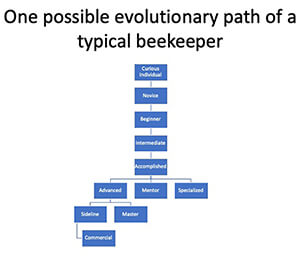
There’s something for everyone
As beekeepers, who are we?
I sense that the typical, non-beekeeping person has a generalized concept of what a beekeeper must be. We most likely seem a bit odd and are able to — in some way — endure stings that are painful and frightening to the unenlightened. I have grown to realize that these “typical” people see an individual beekeeper as a specific entity. To them a beekeeper is a single kind of person.
That view is like describing a car as an “automobile” rather than a distinct model of car. In a different way, this concept is also similar to the description that a member of the military is a “soldier” rather than a rank, assignment, and specific branch of military. Within the beekeeping industry, there are people who just started last spring with two colonies and, at the opposite extreme, there are people who have kept bees for decades and have myriad experiences. Yet, both individuals are “beekeepers.” There’s more to it than that.
Former beekeepers
Each of us who are presently keeping bees can name several people who used to keep them but are now out of the business. The reasons for their departure are numerous. The fact is some people stay and some people go, not just in beekeeping but in everything. Why? I don’t know. And how can you tell who will go and who will stay? Again, I don’t know that answer, but I have seen the following reasons time and again.
In my long experience, I have noticed reoccurring reasons that people leave beekeeping. Honestly, that departure is okay. No one ever said that beekeeping has no exits. It does, and at times, it is best for some people to leave.
Some Common Reasons for
Leaving Beekeeping
- It became boring. For some of us, doing the same things over and over again becomes tiring — sooner or later. After a while, you’ve produced honey (even comb honey), collected pollen, taken a colony from the wall of a house, raised some queens, tried plastic equipment … ad infinitum. Some of us just burn out. Not much that anyone can do to prevent it.
- It became discouraging. This usually happens fairly early in someone’s beekeeping career. Varroa killed all my bees. I must use too many chemicals. They died in the winter. No one wants to buy my honey. My neighbors complained. There’s no shortage of reasons here.
- I had a job change. I have to travel more now. I have to work second shift. I can work overtime. For most of us, beekeeping is not a serious income-generating endeavor. We do it because we enjoy it. Once it becomes a burden, we move on to something else.
- I had a family change. A divorce can disrupt a beekeeping endeavor. An older kid, who assisted, went away to college or got married. Marrying (or remarrying) can bring about a change in energy allocations for beekeeping.
- I had a health change. All kinds of health reasons can result in a change in beekeeping interest. Some are justified physically while others are justified mentally. Though much sadder to others, it’s a sad loss to me when a beekeeper dies and I am forced to remove the deceased’s name from my mail list. It seems so final.
Common reasons for staying in beekeeping
The reasons for staying in beekeeping can’t be listed quite as succinctly as reasons for getting out. For instance, take 1-5 above and reverse them. The reverse of getting out of beekeeping is continuing to keep bees. Beekeeping is exciting. I learn so much! Those varroa won’t drive me out. I’ll figure out something! Now that I’m working first shift, I have more time. All my kids have moved out so I have more time at home. My job is so stressful that I need some way to unwind at home.
There are other more practical reasons such as pollination needs or income generation. Then there are some personal reasons, such as respect and reputation. (An example of a possible statement made to you in the local grocery … “Hey, aren’t you the bee man?”) For whatever reason, some of us stay in beekeeping while some of us leave. For those of us who stay for the long haul, what happens? What’s our future?
Truly, what is a beekeeper?
At any given time, a beekeeper is at a distinct point on their apicultural journey. One may have a strong specific interest at one point and then lose interest and move to another specific point. This is a healthy evolutionary process.
At one point many years ago, I was bonkers for pollen collection. I had multiple trap models. I even bought 5-mesh hardware cloth and built my personal traps. I improvised pollen dryers and I explored purchasing a commercial pollen drying and sifting device, which is now no longer offered in the supply catalogs. I had a good time — until I didn’t. I still have some old traps that are a testament to my time as a pollen collector.
I raised queens. I built all my wooden equipment. I made candles. I wintered colonies in Florida. I moved bees to pollination sites. I built top-bar hives and put bees in them, and I used plastic hive equipment. In all cases, after varying lengths of time, I moved on to other beekeeping subjects.
At this present point on my journey, I enjoy electronic beekeeping. I am nuts for digital photography and videography. I have a YouTube channel that I am slowly neglecting, but I now enjoy working with my partners on a weekly beekeeping podcast.
In my experience, a beekeeper is an evolving, changeable entity. Though I have kept and thought about bees for many decades, it has always periodically shifted for me and therefore, stayed fresh. I fully expect to tire of where I am now, and as I continually age, I expect that I will move to other areas. I don’t know what those areas will be but I look forward to them.
Unlike the beekeepingly unenlightened, I have formed loose personal categories that I attribute to beekeepers. I have had the honor of working with many beekeepers and found each person to be at different places, and these keepers have developed different strengths. The listing that I have developed below is arbitrary and is only my perception of the various types of beekeepers who are presently managing bees. I provide it to you for amusement and argument, and not for established fact.
Some possible levels of beekeeping
- The Curious Individual. We must all start somewhere. Very few of us are born into full-scale beekeeping operations. My assigned label, curious individual, may very well have a double meaning. It could be taken to mean that as beekeepers we are all a bit eccentric, or it can mean that as individuals, we have a sense of curiosity. Regardless, at some point each of us had to ask, “What’s with all this bee stuff?” for the very first time.
- The Novice. The novice is a true beginner and knows nothing about beekeeping except they want to know more. Though some may learn more quickly than others, it’s a phase that we must all go through. How can a brood box be a super? Is this foulbrood? As novices, our questions come fast and furious. Nothing seems to make much sense and everything smells like new pine wood and beeswax.
- The Beginner. This person has taken the plunge and has bees in hive equipment. They have made some of the early-phase mistakes like putting the handholds inside the equipment or having had a package abscond. They are excited, energetic, and frequently nervous.
- The Intermediate Beekeeper. This person is a true beekeeper. The intermediate beginner has settled into all things beekeeping. The terminology has been learned and flows easily. During past winters a few colonies have already died, but some have survived. The energy level of this beekeeper is still hot. Colony numbers are still growing. These beekeepers may already have too many hives for their own good. They have given a few talks at schools and meetings and their friends are aware of their beekeeping commitment. They’ve had some good years and some bad years. They’ve moved a few hives to pollination and they have served as officers in various beekeeping groups. They no longer chase swarms all over the area.
- The Accomplished Beekeeper. This stage is very near the zenith of beekeeping and has many variations. Accomplished beekeepers have acquired skills in subjects like queen production and have produced comb honey. They travel to distant meetings and are frequently involved politically for the good of beekeeping. They have experimented with …


